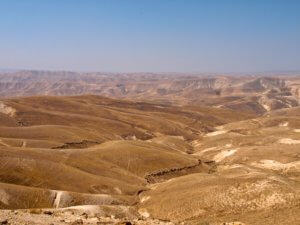
Leading Into Temptation
We had a wonderful Shrove Tuesday Pancake Supper here at Emmanuel this week, with plenty of people, pancakes, and fun. We enjoyed all of the sweet and buttery things that some of us may give up during Lent, and the EDS kids played “pin the pancake on the frying pan” and ran pancake flipping races around the happy group enjoying pancakes and conversation in the library. As people were gathering, we burned the palms left from Palm Sunday in the churchyard, making ashes to mark with a cross the beginning of Lent on our foreheads.
I mixed the ashes from the palms with sweet nard from Jerusalem, the precious oil that the woman with the alabaster jar poured out to anoint Jesus’ still-living feet. The oil was blessed by Archbishop Suheil Dawani, the Episcopal bishop of Jerusalem. We were fragrant worshipers on Ash Wednesday when we came together to exchange the Peace.
 We wear a cross of ashes on our foreheads on Ash Wednesday to remind us of God’s presence among us, and of Jesus’ preparation for his earthly ministry. We remember the ash cross on our own foreheads by seeing the one on our neighbor. And when the sweet scent of nard surrounds us, we add another sense to our awareness of God’s presence and our preparation. And it’s with God’s presence — and our intentional preparation — that we meet this first Sunday of Lent. I might just wear a little nard from time to time to stay mindful of our Lenten purpose and God’s nearness.
We wear a cross of ashes on our foreheads on Ash Wednesday to remind us of God’s presence among us, and of Jesus’ preparation for his earthly ministry. We remember the ash cross on our own foreheads by seeing the one on our neighbor. And when the sweet scent of nard surrounds us, we add another sense to our awareness of God’s presence and our preparation. And it’s with God’s presence — and our intentional preparation — that we meet this first Sunday of Lent. I might just wear a little nard from time to time to stay mindful of our Lenten purpose and God’s nearness.
Jesus in the Wilderness
Our gospel today tells the story of Jesus’ 40 days and nights in the wilderness. The Holy Spirit led Jesus into the wilderness after his baptism in the Jordan River by John. The first thing that the gospel tells us is that Jesus fasted, and at the end of his time in the wilderness, he was famished. We learn that Jesus fasted and was famished before we know anything about the three temptations the gospel tells us Jesus faced.
The first temptation has to do with earthly power, and control over his future. Sure, Jesus is fasting and hungry, but what the tempter actually says is If you are the son of God, then turn these stones into bread. The whole premise of the tempter’s if/then clause is about power and control, not about fasting and self denial: If you are the son of God. It’s really only important that Jesus was fasting and famished to raise the stakes on the power play — for the temptation to have teeth, and for the tempter to be sure Jesus had skin in the game.
Let’s say your favorite food is ice cream. Ok, let’s just be honest and say my favorite food is ice cream. And let’s say that I also love oysters and have eaten way more oysters than a polite person would. Then, the tempter offers me a bowl of ice cream. I have to say, after maybe six dozen oysters — actually that’s not that much of an exaggeration — that I’m not facing a powerful urge. So Jesus had to be famished for the first temptation to matter.
Why does this matter in the gospel? Because often our tradition, and our faith memory, focuses us on self-denial during Lent — the Lenten fast. And I want to be sure that I also — that we also — remember the important work of preparation for our earthly ministries, and that’s all around our purpose, and the true nature of temptation.
Jesus’ Temptation
 Jesus’ 40 days and nights was about temptation — and not about fasting, and not entirely about the wilderness. We don’t know what Jesus did for the whole 40 days, but we do know the three temptations from this passage. Only the first really takes place in the wilderness. The second is on the top of the Temple in the center of Jerusalem, the Holy City. And the third is on a high mountain, looking out over all the kingdoms of the world. And the whole time Jesus was in the wilderness, he was never more than an hour or so’s walk out to warmth, food, and shelter.
Jesus’ 40 days and nights was about temptation — and not about fasting, and not entirely about the wilderness. We don’t know what Jesus did for the whole 40 days, but we do know the three temptations from this passage. Only the first really takes place in the wilderness. The second is on the top of the Temple in the center of Jerusalem, the Holy City. And the third is on a high mountain, looking out over all the kingdoms of the world. And the whole time Jesus was in the wilderness, he was never more than an hour or so’s walk out to warmth, food, and shelter.
There is a place in Jerusalem that you can stand on Mount Scopus, on a ridge that peaks again at the Mount of Olives. On one side you can see out over the Kidron Valley to the old city and see the Dome of the Rock and Holy Sepulchre. Look the other way, and you see the vast expanse of wilderness, dotted with ancient villages, Israeli settlements, grazing herds of sheep and goats, and Bedouin camps. Only the Israeli settlements would not have been a feature when Jesus walked there.
It’s important to understand how accessible the wilderness was to Jesus, because it’s a place any of us can go any time to think and pray to figure out temptation. For Jesus, really figuring out temptation was not about hunger, and whether he could keep his resolutions while he was hungry because he was tempted to eat, but about recognizing his own motivations.
What is Temptation?
What is temptation really? Oscar Wilde famously said, I can resist anything but temptation. In the wilderness, Jesus was facing temptation and wrestling with difficult priorities, like earthly power, ego, control over his future, and obedience to the life he was choosing. His famished fasting just raised the stakes on the wrestling match with the tempter — sweetened the pot, so to speak.
Musician, theologian, and former Yale Marquand Chapel Dean Maggi Dawn writes, If temptation were all about blatant wrongdoing, it would be far easier to avoid. Right and wrong is comparatively easy — even for us manifestly flawed human beings. But real human motivation can get tricky sometimes. We can do the right things for the wrong reasons, like giving up chocolate for Lent so that other people will notice our self-denial and think we’re very holy. Or giving up carbs to lose weight and fit back into our favorite pants, using the structure and discipline of Lent as a mechanism for our vanity. Oops. I know I’ve stumbled there.
As poet T.S. Eliot wrote in Murder in the Cathedral, a play about twelfth-century Archbishop of Canterbury Thomas Becket’s murder in Canterbury Cathedral, the temptation of misleading ourselves about our own motivations is one of the toughest of all temptations to resist. In his case, Thomas Becket wanted to be a martyr — to die in what he saw as a Christ-like way — for his beliefs. While he did so at the last, he had to check himself to be sure that he was actually standing for beliefs he held and not aiming for his own glory. Here is Thomas Becket’s reflection on temptation in Eliot’s play:
The last temptation is the greatest treason:
To do the right deed for the wrong reason.
It’s important to notice our motivations for our actions — and our decision-making processes — and to stay connected to the Easter people of resurrection and new life we are trying to become. If we stay connected to the truth and goodness that reside in God rather than finding the right thing — chocolate, coffee, wine, or cake — to “give up” during Lent, we can live by the motto drawn from Augustine’s teaching—“Love God, and do what you like.”
Overcome Temptation by Identifying Our Underlying Motives
Overcoming temptation —for us as well as for Jesus—is not about obeying rules. It’s about identifying our underlying motives, about the choices set before us, and about taking the ones that make us fully human in honest service of our calling.
Just last week, I toured the MLK Community Center with Alyson Novick, the Director of Development, following up on the gift of a portion of our Baum Fund moneys for program there. Many of you have direct experience volunteering at the Center. As you know, it has a very impressive reach, providing food resources — fresh fruits and vegetables along with milk, meats, and canned and boxed goods — and nutritional and cooking education to those who need that support.
Emmanuel has provided fresh produce to MLK from the hydroponics unit in the past, and just last week, Catherine Curtis and the team from Salve Regina restarted the hydroponics unit, planting the seeds that will produce lettuce and kale for the MLK Center’s food resource center. Growing food during Lent instead of giving up some favorite food is a counterintuitive but very fitting discipline to prepare for our ministries. We can work to serve others, and act in kindness and care for our environment, all while living into our ministries and a commitment that is fulfilling and enriching. We can do the right thing for the right reasons.
It’s interesting, isn’t it, that seeds aren’t dormant while they’re preparing for their next stage. Instead, they are taking on nutrients and water, greening inside their sheath, and actively becoming the food they will be. The seeds are great metaphors for God’s people during Lent. We might fast to reduce our distractions, but without denying ourselves the water and nutrients we need to grow and change.
 Thinking back to the Ash Wednesday crosses on our foreheads, made from palms burned on Shrove Tuesday, it’s interesting to remember that ashes have, throughout human history, been used as fertilizer to stimulate new growth. I hope the memory of our ash crosses fertilizes and feeds our growth during this Lenten season. As we pray, nourish ourselves in our faith, and sprout and green with new growth, let’s keep our ash crosses in our minds and hearts, and hold the scent of nard as a reminder that God is with us. Amen
Thinking back to the Ash Wednesday crosses on our foreheads, made from palms burned on Shrove Tuesday, it’s interesting to remember that ashes have, throughout human history, been used as fertilizer to stimulate new growth. I hope the memory of our ash crosses fertilizes and feeds our growth during this Lenten season. As we pray, nourish ourselves in our faith, and sprout and green with new growth, let’s keep our ash crosses in our minds and hearts, and hold the scent of nard as a reminder that God is with us. Amen
